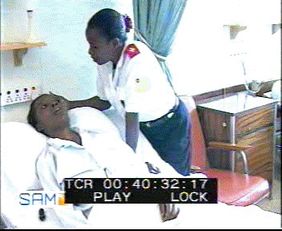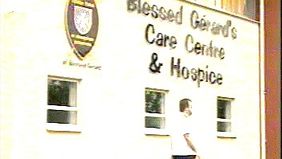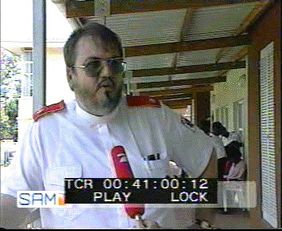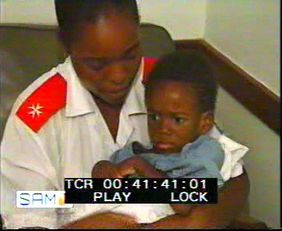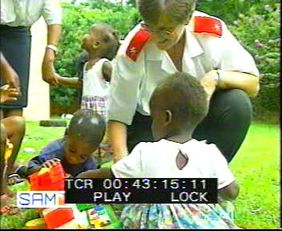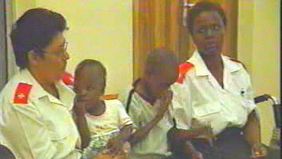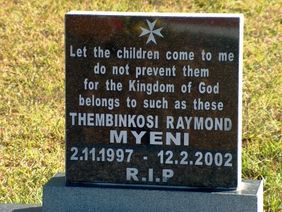AIDS
Here in Germany, the deadly immunodeficiency is hardly ever talked about. In Africa, however, it is devastating an entire continent. In South Africa, almost a thousand people die every week as a result of AIDS. Last year we were already there and visited three-year-old Thembinkosi and his mother. Both had AIDS. The mother was already in the terminal stage and she also died of the deadly disease soon after our filming. Before she died, she took her little boy to a hospice and said, "Take care of him until he dies too!"
Thembinkosi moans in pain. The three-year-old weighs only ten kilos. He is tormented by fever attacks more and more often. His little body is fighting an incurable disease: Thembinkosi has AIDS. Aids in its final stage. Sister Sindi, cares for Thembinkosi " It breaks your heart to see a small child in such pain. Thembinkosi doesn't know what is happening to him. He can't even express himself properly yet."
Thembinkosi's mother Khululiwe. A year ago she was in the same condition as her son is now: Terminal AIDS. Thembinkosi had not yet developed the disease. Now he is hardly recognisable: completely emaciated, he can hardly speak. Khululiwe died a few weeks after the filming. The young woman already seemed to suspect that her life would soon come to an end.
Khululiwe, 18, died last October "I am in incredible pain, I can hardly breathe and I can't stand up. I know I'm going to die soon - and I know my son will die soon too." And yet: like many of the patients here, Khululiwe had a dignified death. She did not have to perish miserably, like most AIDS patients in South Africa.
She was loved until the end: in Father Gerhard Lagleder's hospice. For a good five years now, the monk from Bavaria has dedicated his life to people no one wants any more: the terminally ill of KwaZulu Natal. Father Lagleder, cares for AIDS patients "It is an AIDS hell. It is a place where AIDS has become so rampant and the problem is that the hospitals are completely overcrowded. The hospitals can't cope with the patients anymore and then when the hospitals see 'Well we can't help him anyway' then they just send people home."
Sindi accompanied Thembinkosi's mother Khululiwe until her death. And now she is doing everything she can to fulfil the deceased's last will and testament. Sindi: "Before Thembinkosi's mother died, she asked all of us to take care of Thembinkosi. In the last days before her death, Khululiwe wanted her son with her all the time." Take care of Thembinkosi. Sindi has taken this wish to heart. She does everything to ease the boy's pain. But unlike in Europe, medicines for AIDS patients are scarce here.
One thing is abundant in the hospice: love for the patient. Sindi: "At the moment, Thembinkosi is not interested in anything, but he likes it when you take him in your arms and squeeze him really tight. He always liked to cuddle in the past and was very in need of love. And now, of course, he needs it even more."
Helping children like Thembinkosi is also Clare's goal. The South African co-founded the hospice. And she knows that these children need help. Children like Bongani. The one-year-old has lost [father and] mother to AIDS, and is [possibly] HIV-positive himself. Little Hope: she has been living in the hospice since [shortly after] her birth. Is an AIDS [or social] orphan.
To make these children feel even more comfortable in the future, a children's home is to be built here in a few weeks. Clare Kalkwarf, cares for AIDS orphans "At the moment the children are still in the hospice. Actually, we never planned to have a children's ward here. It sort of came about on its own. Simply because many mothers die of AIDS here and their children are then left behind alone."
In the slums, misery and violence determine everyday life. Aids spreads like wildfire. Thembinkosi's mother was probably infected with the HIV virus during a rape. At birth, her son was also infected with the AIDS virus. Only recently has there been a drug that prevents this. Sindi, hopes for help for AIDS patients "This is a serious problem in South Africa. We hope that the government will soon make the life-saving drug Nevirapine available to all mothers. This drug prevents AIDS from being transmitted from mother to child at birth."
The drug could have saved Thembinkosi too. But now it is too late.
Up to 300 people are buried every day in KwaZulu Natal. Unless a miracle happens, this number will soon triple.
Lagleder, "Angel of the Terminally Ill" : "I often compare the AIDS situation here in South Africa to the Titanic ship. There are about 10 % who are not HIV-positive and those would be the people who sit in the rescue boats and the other 90 % who sink. There is nothing you can do. The only thing you can do is to do what is told about the Titanic, namely that this orchestra was still playing, that we try to reach out to the people in their terrible situation, show them, you are not alone, you are safe, you are not dying alone."
For the AIDS boy Thembinkosi, it is one of the last visits. Day by day he loses more weight. Here, in the nearby cemetery, the terminally ill Thembinkosi is to find his final resting place. This is what his mother wanted. Everyone knows: Thembinkosi's time is limited. But during this time he should want for nothing. Sindi, cares for Thembinkosi "At the moment he needs love, lots of love and care. And I pray that God will help him." The little boy is one of thousands of children dying of AIDS here in South Africa. Just three days after our visit, Thembinkosi fell asleep forever.
On 12 February 2002, Thembinkosi's mother was able to hold him in her arms again - in heaven.
This programme was an update to an earlier ProSieben programme
AIDS Reportage South Africa by Philipp Hahn, ProSieben TV Germany
